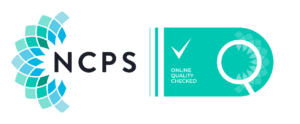Certificate in Clinical Supervision Including
Online and Telephone Working
The next course will begin in July 2024
This counselling supervision training is delivered entirely online inside the purpose-built Counselling Tutor virtual learning environment.
You will also attend live, tutor-led, sessions, live supervision demonstrations, work online with peers and receive observational feedback from tutors.
(The live events are held on Zoom)
Click the button below to download your free course handbook and get all the essential information!
- Please ensure you meet the enrolment criteria before joining (details below under ELIGIBILITY)
- After joining the update list you will get the handbook and pricing sent to you via email.

Providing quality training for agencies, learning institutions and organisations





Got a question about this training?
TRAINING COURSE DETAILS
The Counselling Tutor Certificate in Clinical Supervision including Online and Telephone Working leads to a professional qualification in clinical counselling supervision.
This training gives you the tools, and knowledge, to be able to work professionally and safely with supervisees, in both a face-to-face setting and online using digital technology and telephone.
Upon graduation, you can submit your qualification to your professional body and offer supervision in a face-to-face setting as well as online.
The training aims
- Gain a professional qualification that you can use in service of others
- Enhance your knowledge and understanding of supervision
- Become skilled in the technology, practice, and ethics of online supervision delivery
- Progress your career and professional standing
- An ideal route for those therapists who choose to apply for an accredited supervision status
This training follows the guidance set out in the BACP Counselling Supervision Training Curriculum published by BACP Professional Standards.

Price
The price of the supervision training is £1600. This includes all live tuition, lifetime access to the learning portal for revision, membership of the Supervision peer group, and all assignment and certification fees. We also offer a flexible payment plan for those who wish to split the cost over a number of months.
SUITABILITY
Have you considered training as a clinical counselling supervisor?
Or, perhaps you are already a supervisor but wish to update and expand your knowledge to cover supervising online?
Perhaps "now" feels like the right time to take that next step in your professional journey and make an investment in yourself and your practice.
If you are a qualified therapist, or supervisor, with over 2 years of practice experience, and you feel ready to stretch yourself and be inspired, then this training may be a perfect fit for you.
(please see eligibility criteria below)

WHY UPSKILL NOW?
There has been a massive explosion in the numbers of counsellors who have upskilled to work online due to social distancing.
Online work has become quite predominant, with thousands of therapists and agencies offering blended delivery including working remotely and by telephone.
Ethical good practice suggests - online practitioners should get supervision from a supervisor who is trained in the medium of working.
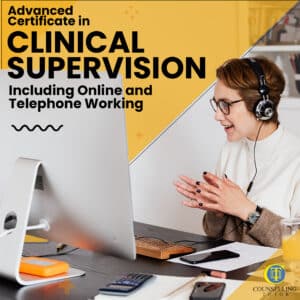
The British Association for Counselling and Psychotherapy (BACP) states in its Online and Phone Therapy (OPT) Framework (2021, p. 13) that its members must have:
7 Ability to source and make use of appropriate supervision for OPT
i. An understanding of how to source a supervisor with knowledge and experience of OPT
ii. An ability to make use of online/phone supervision, e.g. by:Engaging with supervision that parallels the type of therapy offered e.g. phone, online platform, email
Acknowledging in supervision the particular phenomena raised in blended therapy e.g. phone and in the room, online and in the room, phone and online.
Using supervision to reflect on and discuss the impact OPT may be having on the client and/or practitioner using supervision to support and develop own OPT practice.

PRACTICE DEVELOPMENT OPPORTUNITY
Becoming skilled in this important area of clinical supervision may therefore represent an opportunity to develop your practice.
Gaining the competence to supervise both face-to-face and online opens new professional and personal development opportunities.
Blended service delivery (face-to-face and online) has now been widely adopted as the delivery method going forward as it offers clients choice and convenience.
This training course covers both traditional face-to-face supervision, as well as up-to-date online and telephone working, with supervisees who offer online or telephone services.
This training will support you in expanding your ability as you broaden your skillset and gain confidence, and real-world experience, within a safe learning environment.
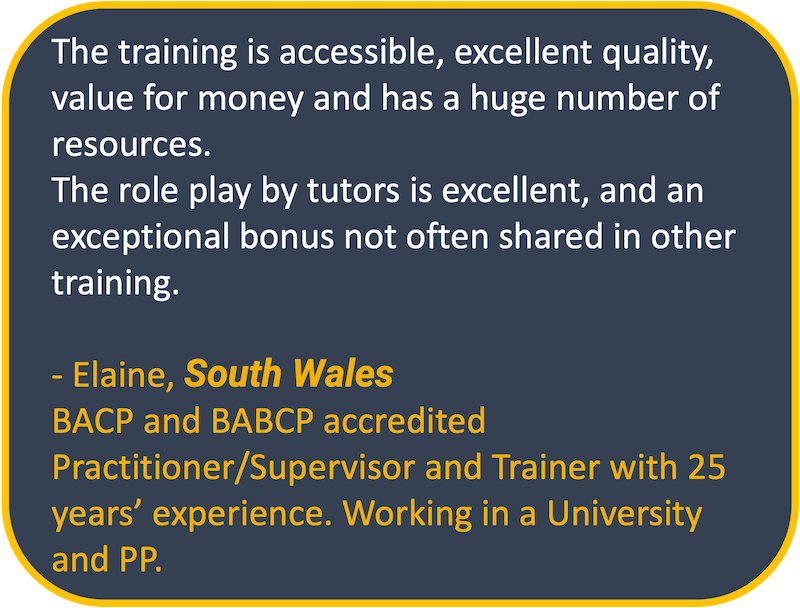
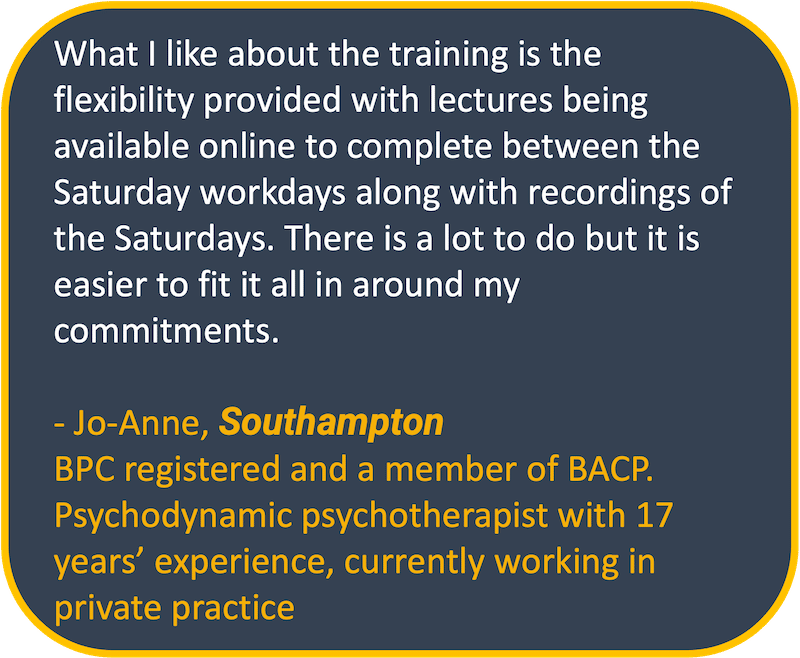
ELIGIBILITY AND ENROLMENT CRITERIA
This training is suitable for practitioners who…

- Hold a formal, recognised qualification in counselling or psychotherapy at diploma level or above
- Have been in practice for a minimum of 2 years post-graduation (or have over 400 hours of practice experience)
- Are a member of a professional body and work within an ethical framework
- Attend regular supervision according to the requirements of their professional body
- Undertake regular Continuing Professional Development in line with their professional body requirements.
If you fulfil our eligibility criteria, please also reflect on:
- Supervisors have a vital role in upholding ethical practice and professional standards of the profession. This is a role which safeguards good practice, therefore your individual experience needs to be of a sufficient depth and breadth, which cannot be measured numerically.
- A supervisory role requires your commitment to ongoing learning and development and the ability to create constructive learning environments with supervisees.

While we welcome students whose first language is not English, fluency in English (both spoken and written) is essential in order to participate fully in all elements of the course and to achieve its learning outcomes. Please contact us if you are unsure whether your proficiency in English is sufficient. We reserve the right to remove from the course anyone who proves unable to meet this standard.
Counselling Tutor’s learning materials are based on professional counselling and psychotherapy practice in the UK. We welcome students and practitioners from other countries and encourage and embrace the exchange of knowledge and experience. It is your responsibility to adapt the content of our materials to where you practise. Before starting a course, you may wish to contact your professional body to check that it fits their requirements for practitioner development. We are here to support you within the bounds of our UK remit.

Further requirements

COURSE DELIVERY
This flexibility means the training can fit around a busy work, home, life balance.

BLENDED LEARNING
- Video lectures presented by Rory Lees-Oakes
- Downloadable slide packs, transcripts, and sound files
- Practical case discussion applying the material to practice, and looking at real-world applications
- Resources and downloads
- Tasks to reflect on
- Additional learning and access to related specialist lectures
- Suggested reading and viewing
- Live teaching, including tutors demonstrating supervision practice
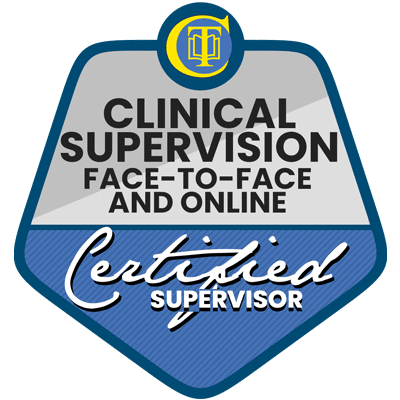
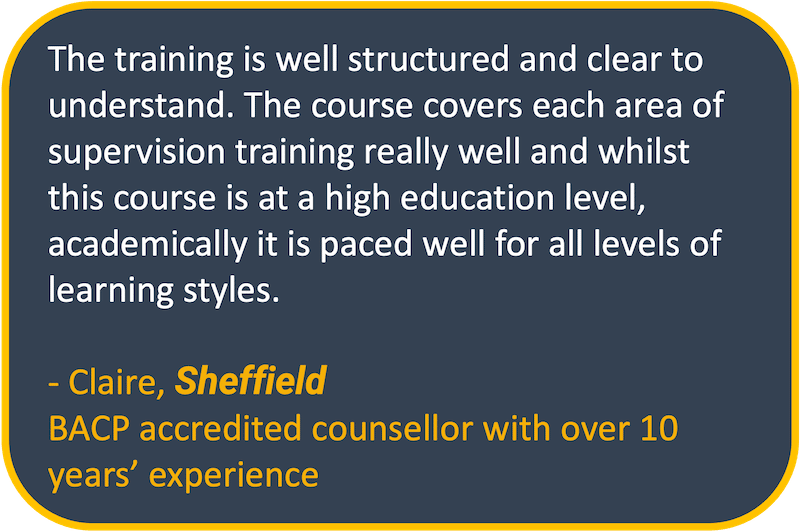

No matter what your base modality, the Counselling Tutor online supervisor training will give you the structure, skills and competencies to clinically supervise counsellors safely and ethically.
8 modules and 40 lessons guide you through everything from setting your supervisory mindset, creating your contracts and practice paperwork, and delivering clinically sound supervision.
The course is underpinned by the Shohet and Hawkins Seven-Eyed Model of supervision developed by Peter Hawkins and Robin Shohet.

Assessment and Placement
After live session 6 of the training, you will have 90 days to complete parts 1 and 2 of the assignments.
- Assignment 1 is a 2000-word essay.
- Assignment 2 is a transcription of a recorded session.
You will be supported through the assignments by the tutor team so you don't have to do this alone.
Our team is neurodiverse-friendly. If you have any challenges such as dyslexia, ADD and ADHD, then please do let a tutor know and you will be supported.
An in-depth assignment briefing in week 6 will cover all aspects of both assignments including word counts for each section, how to record and transcribe using free tools, and how to reference.
You will have the opportunity to ask questions and get additional support where you need it.
Tutor observations also form part of the formative assessment of the course.
Peer practice sessions observed by tutors are for developmental purposes and working towards fitness to practise.
Supervision Placement
The final part of the assignment – 20 hours of placement supervision – needs to be submitted within 12 months after the final live session.
You will need to find placement supervisees to work with to gain your placement hours. Counselling Tutor do not supply supervisees; however, we will give guidance on where to find supervisees.
Our team will help as much as we can using our resources.
Practice hours requirement:
Our course aims to produce competent, confident supervisors who can work both online and face-to-face with their supervisees.
This means that you will ideally complete some of your practice hours via each mode of delivery:
• To gain experience and skills as an online supervisor, you need to complete at least five of your 20 practice hours online.
• We strongly recommend that you don’t do all your hours online, so that you gain experience and confidence in face-to-face supervision too.
If your circumstances mean you’re unable to do any face-to-face hours, please contact us. We’ll do our very best to understand and accommodate your needs.
We regret that we can’t count group supervision hours, as this course focuses purely on individual supervision.
COURSE PRESENTERS
To become a great supervisor requires a robust understanding of the theoretical principles, underpinned with support and confidence building through real-world experiential practice. You will undertake this journey under the expert guidance of our kind and patient tutor team who serve with a passion to make a difference in the world.
Our tutors are counsellors, as well as highly experienced supervisors, and each holds a formal teaching qualification as well as a certificate in online and telephone working.
This means you get expert guidance, feedback, and support as you build your competencies, theoretical knowledge, and practical experience.
Our team is neurodiverse-friendly. If you have any challenges such as dyslexia, ADD and ADHD, then please do let a tutor know and you will be supported.
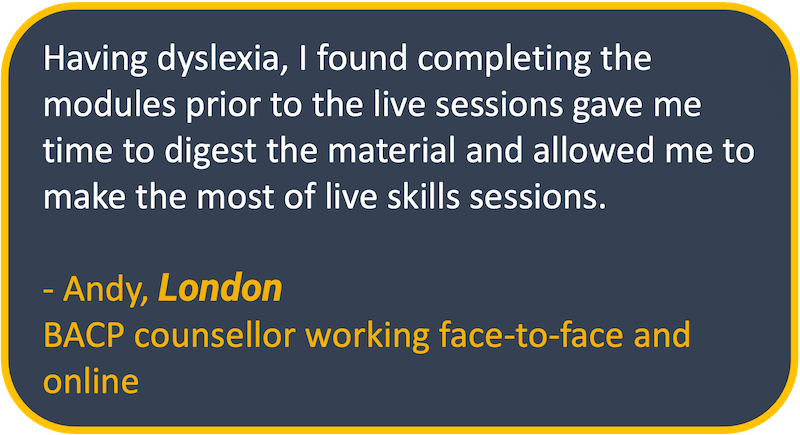
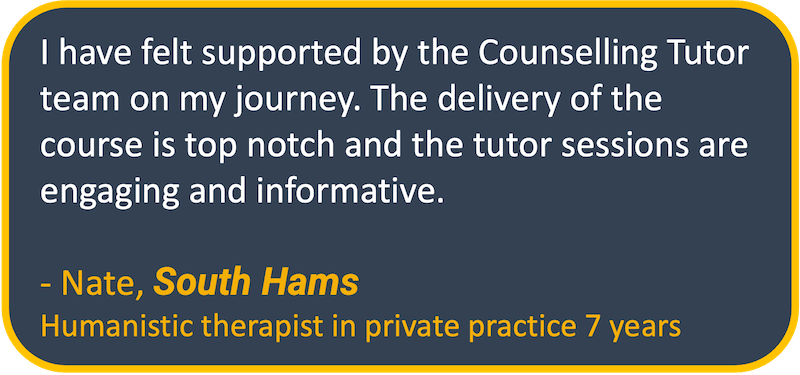
The balance of self-directed learning, tutor-led session, and experiential training with your course peers gives a rich and varied learning journey that is supportive, engaging, and enjoyable.
You will be joining a counselling family of like-minded peers where you can both give and receive support.

Kenneth Kelly
Kenneth – or Ken – Kelly is a practising counsellor and a clinical supervisor.
Ken completed a post-graduation certificate in online and telephone counselling in 2012.
He also holds a teaching qualification and authored the textbook Basic Counselling Skills: A Student Guide.
In his position as Co-Director at Counselling Tutor, Ken focuses on online training provision and specialises in outcome-based online learning.

Rory Lees-Oakes
Rory Lees-Oakes is Co-Director at Counselling Tutor and author of Counselling Theory in Practice: A Student Guide.
He spent over a decade lecturing in counselling. Rory is a qualified counsellor, clinical supervisor and lecturer.
In 2015, he was awarded the prestigious Silver Plato award for outstanding use of technology in education. He is also a Fellow of the Pearson Teaching Awards.
An avid drinker of tea, he’s more likely to be found in a tea room than a bar.

Christine Shore
Christine is a qualified counsellor, teacher, lecturer and clinical supervisor. She completed a post-graduation certificate in online and telephone counselling in 2020. Christine has extensive practice experience in several settings, including working with EAPs, care homes, in the workplace and with the constabulary. She has a busy private practice.
Christine is a qualified reiki practitioner and also has a history of experience in one to one work with individuals of all ages in learning support, advice, guidance, education and management. She has carried out phenomenological research into humour in counselling.

Nora Allali-Carling
Nora is an experienced Counsellor, teacher, trainer and clinical supervisor.
Nora has spent more than twenty years teaching and training in Education and currently teaches in Further Education in London.
Nora has a private practice in Surrey where she offers faith-based and culturally sensitive counselling.
In addition to her private practice, Nora has worked for an NHS GP practice, St Christopher’s Hospice and family counselling services.
Nora has published articles on grief, loss and bereavement and is currently completing her MSc in Neuroscience of Mental Health.

Sally-Anne Armitage
Sally-Anne is a BACP accredited counsellor, qualified lecturer and supervisor.
She currently works with police and private clients.
Sally is a passionate therapist, spending much of her free time immersed in rich counselling discussion and research.
Sally has completed a Master’s Degree, which cemented her specialism in trauma and PTSD. She has past experience working for EAPs, in colleges and with offenders.
Sally thrives on interaction, including working remotely in her practice, achieving a certificate in online working.

Maria Scholes
Maria’s work as a counsellor/therapist, clinical supervisor, trainer, tutor and personal development coach is rooted in the humanistic school of psychology that emphasises looking at the whole person. As an integrative practitioner, she draws on various modalities, so the work is tailored to the uniqueness of each client
She has worked within primary care for the NHS, community counselling settings, the voluntary sector, community addictions treatment agency and residential rehabilitation settings.
She has a busy private practice and since the pandemic, most of her work takes place online. She has a postgraduate certificate in online and telephone counselling.
She has always prized supervision as part of her reflective practice and are particularly passionate about group supervision. She uses the Seven-Eyed model of supervision as a framework whilst integrating Proctor’s three tasks.
Her top signature strength is a love of learning which includes supporting others to learn.

Nicholas Lunt
Nick is an experienced counsellor, trainer, and supervisor. He has worked for more than thirty years in the third sector and specifically the management of community based mental health services.
Nick has a private practice and is passionate about ensuring the clients he works with receive the highest quality support. And as a trainer he strives to provide a positive teaching and learning experience.
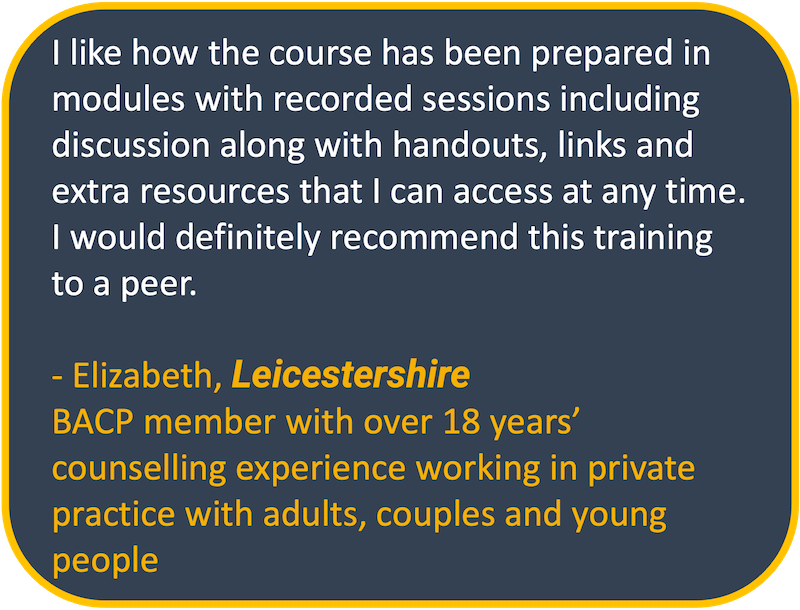
COURSE MODULES & TOPICS


